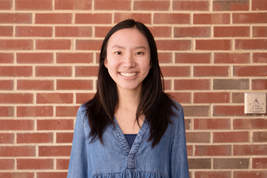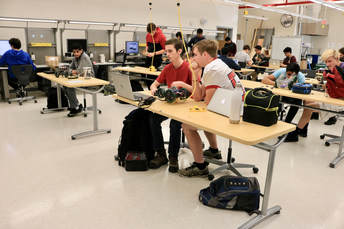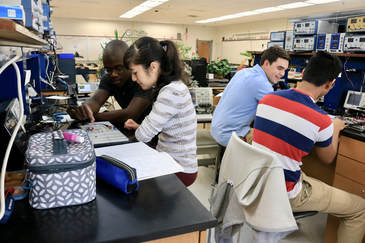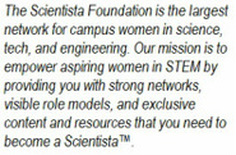|
By Katherine Du
Furiously copying down commands of code in freshman computer science, I felt overwhelmed exploring a field so foreign to me, along with the added on pressure of thinking in the back of my mind that the boys already had years of CS experience before even walking into class. However later in the year, while brainstorming ways to combat the lack of healthcare records when they are urgently needed in the cases of emergencies, I concluded that the optimal solution to solve the problem would include creating a mobile application. That’s when I first became directly aware of the applications of computer science. When it hit me that computer science had the potential to drive positive change on a global scale, I started to nurture my love for the subject. At the same time I was slowly familiarizing myself with programming languages in school, outside of the classroom I was collaborating with a few other teammates to create this mobile application.
The dearth of girls in certain STEM fields, specifically computer science and engineering, should not deter us women from following our academic passions. We should never let societal norms detract us from studying subjects that pique our interest; instead, we should feel empowered to pursue them.
Now, as a senior at a magnet high school with an emphasis on STEM education, I’m conducting senior research in the Computer Systems lab, which is less than 30% female. This doesn’t bother me, however, and it shouldn’t bother you either. If you were to be the only woman in a room surrounded by a sea of men -- whether that’s a classroom, in the workplace, or at an internship -- swipe aside your fears of judgement and perceptions: you deserve to be there just as much as the men. Take a deep breath, then, like a model, strut in there with confidence. Demand respect and equal treatment through your behavior. As the only woman, you will be a pioneer in allowing greater female representation to be characteristic of the new normal. I spoke with a few of my female friends who are conducting senior research in areas that tend to contain small percentages of girls. If representation of women is to expand in these subjects, we need to be comfortable with stepping outside of a preconceived mold. Their convictions may offer you encouragement to do so. Some of their stories and words will hopefully inspire you to be more open-ended while thinking about your career choices, or even empower you to pursue a career currently lacking female representation: Linda Diaz (Automation and Robotics -- 27% female): Intended Majors: “Though engineering is a strong passion of mine, I plan to pursue music in college, specifically in flute performance or music composition.” Senior Research Synopsis: “My project is to automate the practice of orange peeling with the goal of opening doors in the robotic preparation of fresh food and food preparation for those with disabilities, and those who just don't have time.” KD: What made you interested in your senior research field? LD: I find the automation and robotics research lab to be an excellent mix between computer science and mechanical and electrical engineering, and it allows me to create anything that falls into those disciplines, which is a lot. KD: What advice or encouragement would you provide to girls who are interested in this field? LD: Go for it! The world of robotics is exciting and welcomes you! Kanvi Shah (Automation and Robotics -- 27% female): Intended Majors: “Electrical engineering or computer science, or some combination of the two.” Senior Research Synopsis: “Building an amphibious robot.” KD: What made you interested in your senior research field? KS: I've worked on robotics projects since elementary school and been interested in the field for a very long time. After entering high school and taking a few computer science classes as well as the robotics elective last year, I realized that this senior research lab would be perfect to combine all of my technological interests. KD: What advice or encouragement would you provide to girls who are interested in this field? KS: My advice for all girls interested in this field is to pursue it! This field isn't going anywhere for a long time, and there's an endless world out there just waiting for you to implement your innovative ideas. Ashmita Gadwalkar (Computer Systems -- 27% female): Intended Majors: “Computer engineering, computer science, math, and possibly music.” Senior Research Synopsis: “I am currently working on figuring what gets blocked by firewalls, and if we can modify it.” KD: What made you interested in your senior research field? AG: I chose the Computer Systems lab through mentorship (concentrated research built into the school day under the direction of professional scientists) just because I seem to really like coding. Math and programming were two fields I was able to grasp faster than others. It felt like everything clicked, and I can do a lot. I have done most of the computer related courses at school, so Computer Systems just seemed the most logical for me. KD: What advice or encouragement would you provide to girls who are interested in this field? AG: Just do it. Don't think "I can't do it" and just do it. I know people who were good at CS but just thought, "It's a guy’s field." They later regretted not doing what they were good at. There is no such thing as a field for guys and field for girls. Girls should do whatever they feel like is best for them. Don't listen to stereotypes. Natalie Zhang (Computer Systems -- 27% female): Intended Majors: “Computer science or computer engineering, but I’m keeping my options open.” Senior Research Synopsis: “My research will improve DC Metrorail scheduling through an optimization algorithm that determines the best number of trains to have at certain stations, or if a train should skip a stop in favor for a more crowded one.” KD: What made you interested in your senior research field? NZ: Even since freshmen year, I’ve been fascinated by computer science. It was an entirely new STEM field that I was interested in because it I was able to solve problems creatively with logical approaches and solutions. Computer science is also a field that has many implications in advancing society, which I hope to further progress. KD: What advice or encouragement would you provide to girls who are interested in this field? NZ: I’ve had many regrets about opportunities that I should’ve taken because I was scared. There were a lot of programs and clubs I was interested in applying or joining, but I was afraid of looking slow or stupid in front of people who were much more knowledgeable. But remember that at some point, these people began at the same level that you are, and they had to learn what they know now. Don’t be intimidated by knowledge; pursue it. Margaret Covey (Energy Systems -- 13% female): Intended Majors: “I’m not really too sure what I want to major yet, but I’m thinking possibly doing chemical or electrical engineering.” Senior Research Synopsis: “My current project is building an automatic feed pusher for my aunt’s dairy farm. I’m using inspiration from a robotic milking farm with Levy products that I visited with my aunt this past winter break and am hoping that I can build one that is much cheaper than what is currently on the market.” KD: What made you interested in your senior research field? MC: The energy systems lab appealed to me because I was interested in renewable energy. I took the energy systems classes sophomore year and I really enjoyed them. Then, my aunt gave me a project idea for her farm and I knew I had to be in the energy systems lab. KD: What advice or encouragement would you provide to girls who are interested in this field? MC: Don’t pick what [classes] you think looks “good” or what your friends are doing. To any girls interested in Energy Systems, I would say to absolutely pursue it because gender doesn’t impact your success or your voice. Katherine Barbano (Microelectronics -- 9% female): Intended Majors: “Electrical engineering and computer science, with a minor in dance.” Senior Research Synopsis: “I'm working with motion capture and trying to make a device that allows you to tap dance without shoes. Data from accelerometers and gyroscopes on the leg will be processed on the computer through Bluetooth, and a speaker will output the appropriate sound along with its correct volume.” KD: What made you interested in your senior research field? KB: I was actually accidentally placed in electronics class because of a scheduling conflict in junior year, but I'm so glad that I was because I found that electronics was one of the most interesting topics that I'd learned about. It's intriguing to learn how the devices that are everywhere around us work, and you start to develop an appreciation for how complex they really are. KD: What advice or encouragement would you provide to girls who are interested in this field? KB: I believe that the reason for female underrepresentation is that people decide their [academic] “path” very early and never take advantage of the breadth of classes. When you start out taking courses that are more in line with a traditionally girl-dominated field, and when you take courses in only a single area that fail to expose you to more topics, electrical engineering is generally ruled out for females. So no matter your gender, I challenge you to explore a new topic, and in doing so I hope to see you in electronics! Maya Parker (Quantum Physics and Optics -- 22% female): Intended Major: “Physics.” Senior Research Synopsis: “I'm working on Secondary Ion Mass Spectrometry (SIMS). It allows for precise analysis of each layer of a material with a large surface area, as opposed to other types of mass spectrometers that can only analyze a small amount of material, and cannot analyze layers. This type of analysis is important many fields, such as in the development of semiconductors.” KD: What made you interested in your senior research field? MP: I've been interested in physics since middle school, when my dad had me watch science channel shows about things like black holes and relativity. I heard about the Optics lab freshman year, and knew that that was the field in which I wanted to do my research. KD: What advice or encouragement would you provide to girls who are interested in this field? MP: Physics is a tough field for anyone to major in, and it can be a little discouraging to be one of only a few girls in the class. My advice is to stick with the other girls in your classes; help each other out. Do the best you can, and don't feel like you're failing womankind if you aren't at the very top of your class. Physics is tough, and the fact that you're sticking with it and learning the high level physics is a win for all of the women who did have to be the best of the best to gain respect. 
About the Author Katherine Du is a senior at Thomas Jefferson High School for Science and Technology, a magnet school in Virginia. She's interested in the intersection between science and journalism. Katherine is currently conducting computational biology research with a mentor at the National Institutes of Health, and is fascinated by complete strangers she talks to on the metro rides there. As an Editor-in-Chief of her school's newsmagazine, she's interviewed a Nobel Prize winner and is inspired by the voice journalism gives to the underrepresented and misrepresented. Katherine also loves to adventure with her three younger siblings. She'd love to hear from you at [email protected]. Comments? Leave them below!
0 Comments
Your comment will be posted after it is approved.
Leave a Reply. |
Education BlogAbout ScientistaSubscribe!NEW!New PostsWhat's HotClick to set custom HTML
You Might Like...
Connect With UsLatest tweets |
The Scientista Foundation, Inc. All Rights Reserved © 2011-2021 | Based in NY | [email protected]
The Network for Pre-Professional Women in Science and Engineering
The Scientista Foundation is a registered 501(c)(3) -- Donate!
The Network for Pre-Professional Women in Science and Engineering
The Scientista Foundation is a registered 501(c)(3) -- Donate!




 RSS Feed
RSS Feed









